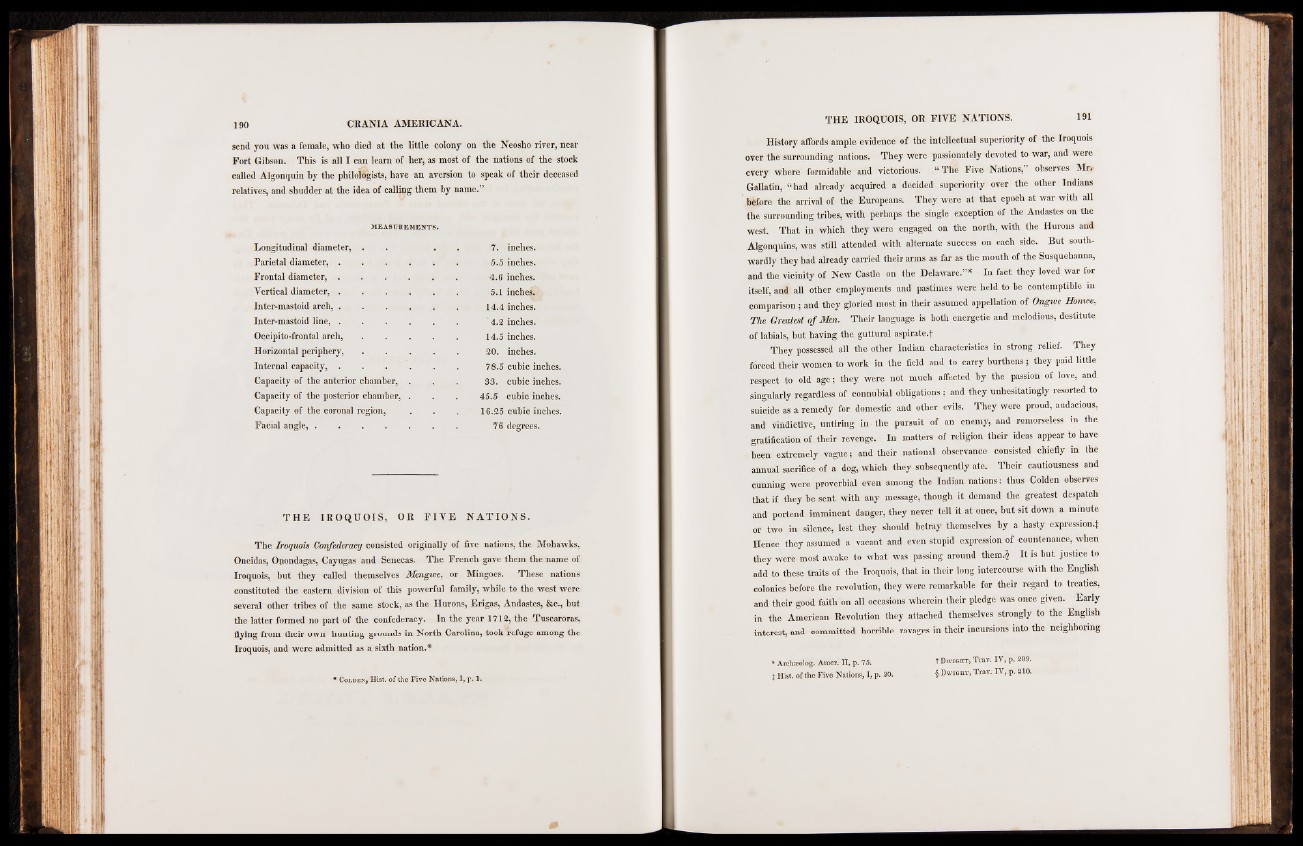
send you was a female, who died at the little colony on the Neosho river, near
Fort Gibson. This is all I can learn of her, as most of the nations of the stock
called Algonquin by the philologists, have an aversion to speak of their deceased
relatives, and shudder at the idea of calling them by name.”
MEASUREMENTS.
Longitudinal diameter, . #
Parietal diameter, . . . . .
Frontal d iam e te r,.......................................
Vertical diameter, . . . . .
Inter-mastoid arch, . . . , .
Inter-mastoid line, . . . . .
Occipito-frontal arch, . . . .
Horizontal periphery, . . . .
Internal capacity, . . . . .
Capacity of the anterior chamber, . .
Capacity of the posterior chamber, .
Capacity of the coronal region,
Facial angle, . . .
7. inches.
5.5 inches.
4.6 inches.
5.1 inche$.
14.4 inches.
'4.2 inches.
14.5 inches.
20. inches.
78.5 cubic inches.
33. cubic inches.
45.5 cubic inches.
16.25 cubic inches.
76 degrees.
T H E IROQUOIS , OR F IV E NAT IONS .
The Iroquois Confederacy consisted originally of five nations, the Mohawks,
Oneidas, Opondagas, Cayugas and Senecas. The French gave them the name of
Iroquois, but they called themselves Mengwe, or Mingoes. These nations
constituted the eastern division of this powerful family, while to the west were
several other tribes of the same stock, as the Hurons, Erigas, Andastes, &c., but
the latter formed no part of the confederacy. In the year 1712, the Tuscaroras,
flying from their own hunting grounds in North Carolina, took refuge among the
Iroquois, and were admitted as a sixth nation.*
History affords ample evidence of the intellectual superiority of the Iroquois
over the surrounding nations. They were passionately devoted to war, and were
every where formidable and victorious. The Five Nations, observes Mi>
Gallatin, “ had already acquired a decided superiority over the other Indians
before the arrival of the Europeans. They were at that epoch at war with all
the surrounding tribes, with perhaps the single exception of the Andastes on the
west. That in which they were engaged on the north, with the Hurons and
Algonquins, was still attended with alternate success on each side. But southwardly
they had already carried their arms as far as the mouth of the Susquehanna,
and the vicinity of New Castle on the Delaware.”* In fact they loved war for
itself, and all other employments and pastimes were held to be contemptible in
comparison; and they gloried most in their assumed appellation of Ongwe Ilonwe,
The Greatest o f Mm. Their language is both energetic and melodious, destitute
of labials, hut having the guttural aspirate#
They possessed all the other Indian characteristics in strong relief. They
forced their women to work in the field and to carry burthens; they paid little
respect to old age; they were not much affected by the passion of love, and
singularly regardless of connubial obligations ; and they unhesitatingly resorted to
suicide as a remedy for domestic and other evils. They were proud, audacious,
and vindictive, untiring in . the pursuit of an enemy, and remorseless in the
gratification of their revenge. In matters of religion their ideas appear to have
been extremely vague; and their national observance consisted chiefly in the
annual sacrifice of a dog, which they subsequently ate, Their cautiousness and
cunning were proverbial even among the Indian nations: thus Colden observes
that if they he sent, with any message, though it demand the greatest despatch
and portend imminent danger, they never tell it at once, but sit down a minute
or two in silence, lest they should betray themselves by a hasty expression.*
Hence they assumed a vacant and even stupid expression of countenance, when
they were most awake to what was passing around them.J It is but justice to
add to these traits of the Iroquois, that in their long intercourse with the English
colonies before the revolution, they were remarkable for their regard to treaties,
and their good faith on all occasions wherein their pledge was once given. Early
in the American Revolution they attached themselves strongly to the English
interest, and committed horrible ravages in their incursions into the neighboring
* Archaeolog. Amer. II, p. 75.
% Hist, of the Five Nations, I, p. 20.
t Dwight, Trav. IV, p. 209.
§ Dwight, Trav. IV, p. 210.